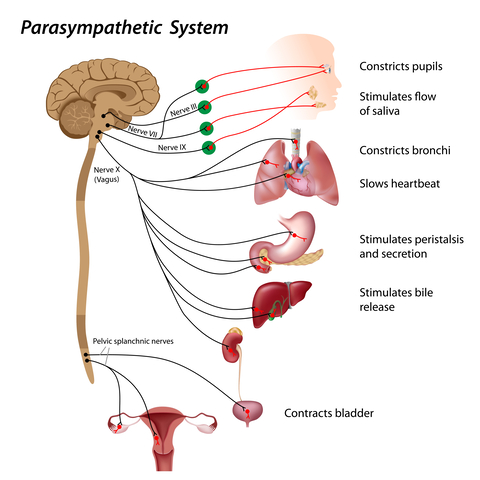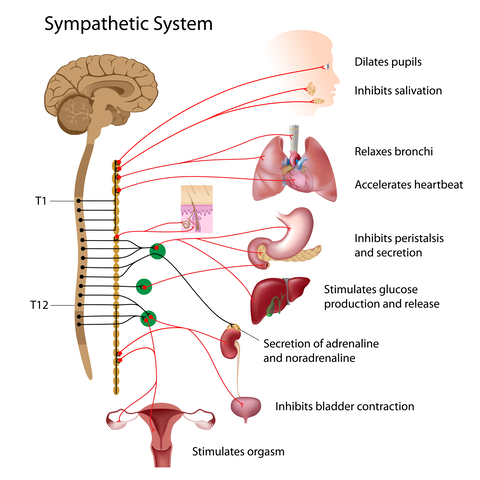When you’re feeling anxious, it’s easy to ask, “what’s wrong with me?” It feels like the emotions and body sensations you feel when you’re anxious are abnormal. And if they’re abnormal, that must mean there’s something wrong with you. But what if everything you’re feeling was completely normal? This blog post gives you all the information you need to really start understanding anxiety.
The Nervous System
Your nervous system consists of different parts. For example, the sympathetic nervous system helps you face threats. Likewise, the parasympathetic nervous system helps you with digesting food and rest. These nerves have opposite actions, and typically one will be dominant at any given time. Understanding the nervous system is essential to understanding anxiety.
Parasympathetic Nervous System
The parasympathetic nervous system plays a large role in rest and digestion. When this part of your nervous system is dominant, your heart rate and breathing slow down. You probably won’t notice it, but your body starts digesting food, aided by increased saliva, bile, and stomach secretions.
More importantly, the parts of your brain responsible for reasoning can do their job when the parasympathetic nervous system is dominant.

Sympathetic Nervous System

The sympathetic nervous system helps you when you’re facing a threat. When this part of your nervous system dominates, your heart rate and breathing increase. Your pupils dilate and your body does everything it needs to in order to get blood and resources to body parts needed to fight off the threat.
That also means you’ll stop salivating, your body stops digesting, and areas of your brain responsible for critical thinking, reasoning, and memory go offline.
Anxiety and Fight or Flight
As mentioned before, the nervous system is key to understanding anxiety and answering the question “what’s wrong with me?” When we are comfortable, the parasympathetic nervous system dominates.
But sometimes, our brain perceives a threat in something. When this happens, the sympathetic nervous system dominates. Unfortunately, our brains and nervous systems have not evolved enough to recognize that you do not need to fight, run away, or freeze when facing everyday threats now. Yet that’s what your body is preparing you to do.
As an example, imagine if your boss tells you she needs to speak to you in her office before you leave today. Well that’s it. Your brain connects that with other times you’ve been asked to speak to someone in authority, and all of a sudden, you’re feeling anxious. Your mouth is dry, your palms start sweating, you’re shaky, and you might even feel nauseous or skip lunch.
Mind and Body Connection
Of course anxiety isn’t just the body based symptoms caused by our nervous system’s reaction. It’s also the thoughts that go along with them. For example, you might notice your heart racing. Without an easy answer to why, you automatically start thinking that this is it; you’re dying. When in reality, your rapid heart rate might be easily attributed to something else, such as caffeine.
When you’re coping with anxiety, your thoughts also add to the “threat” your nervous system reacts to. They act like a runaway train, gaining speed and momentum. And as your thoughts add to that original threat, the reaction strengthens. Your thoughts and physical symptoms feed off each other. You can’t out-think anxiety when you’re already anxious. Remember, the rational parts of your brain go offline when you’re facing a threat.
Let’s imagine your boss tells you he wants to talk to you in his office at the end of the day. Your sympathetic nervous system activates, as does the runaway train of your thoughts. By the end of the day, you’ve convinced yourself your boss is going to fire you, you’re never going to get another job again, you’re going to lose your house, and your family and everything else important to you.
So What's Wrong with Me?

When your thoughts start spiraling and your body starts responding to the perceived threat, you feel like you’re “going crazy.” There’s something wrong with you and there’s no way your reaction is “normal.” You see your actions as out of proportion to what is actually going on.
In reality though, your body is just responding exactly how it’s supposed to when you’re facing a threat. You’re not defective or broken or anything else your anxious mind tries to tell you.
Understanding Anxiety - What Can I Do?
While your physical and emotional reactions to anxiety are normal when you’re facing a threat, you don’t want to live like that. You want to be comfortable in your body. And you don’t want your brain seeing a threat where there isn’t one. So what can you do about your anxiety?
There are many ways you can go about managing your anxiety. First, you might find that there are things that do help you manage your anxiety. And then you can deliberately do these things to keep your anxiety at bay. For example, a regular yoga practice might have started out as a workout. But overtime, you might find that you’re feeling less anxious on days you do yoga.
Counseling can also help you learn to manage anxiety. Part of this might be learning coping skills that help you. But another big part of counseling for anxiety includes addressing things that might be driving your anxiety. For example, if your anxiety is a result of trauma, it might be helpful to process that trauma in order to resolve your anxiety.
Some people also find benefit in using medications to help manage their anxiety. Keep in mind though that benzodiazapines, such as Xanax or Clonapin, have addictive properties and many psychiatrists will not prescribe them. Instead, using an antidepressant or even certain blood pressure medicines can help manage your anxiety symptoms more safely. Talk to your doctor to see if medications might help you with your anxiety.
Final Thoughts
Anxiety makes you question what is wrong with you. But once you start understanding anxiety, it’s easier to see that you’re not as abnormal as you feel. Your anxiety symptoms result from natural responses in your nervous system. And while these are normal responses, you can learn to manage them.





